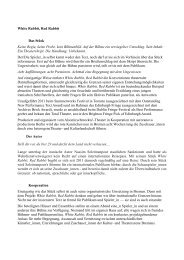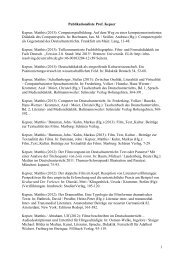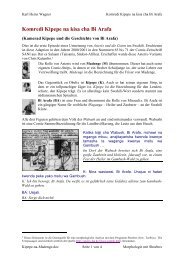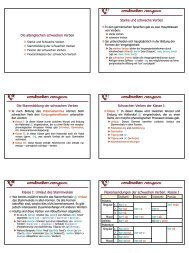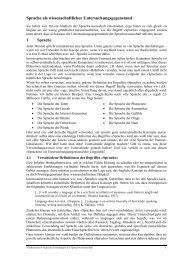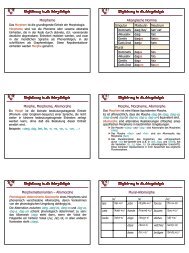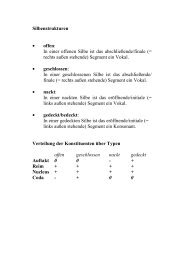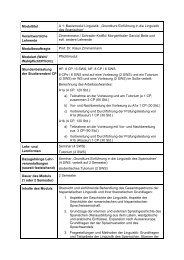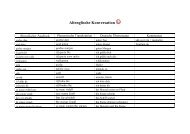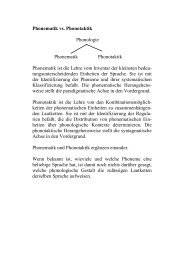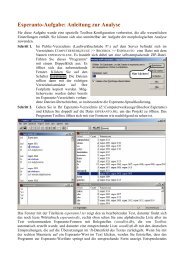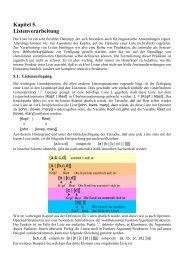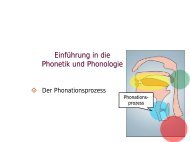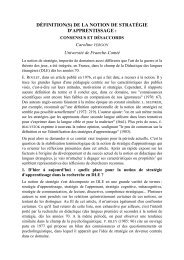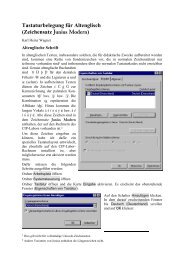Relativism and Universalism in Linguistics - Fachbereich 10 ...
Relativism and Universalism in Linguistics - Fachbereich 10 ...
Relativism and Universalism in Linguistics - Fachbereich 10 ...
Create successful ePaper yourself
Turn your PDF publications into a flip-book with our unique Google optimized e-Paper software.
24 Sections<br />
The contribution of l<strong>in</strong>guistic relativism, language universals<br />
<strong>and</strong> the ecology of language to praxis oriented<br />
language revitalisation efforts<br />
Darquennes, Jeroen<br />
FWO-Vla<strong>and</strong>eren / Research Centre on Multil<strong>in</strong>gualism (Brussels)<br />
jeroen.darquennes@kubrussel.ac.be<br />
Approach<strong>in</strong>g European language policy from a positive angle Peter Nelde (2001) describes<br />
how dur<strong>in</strong>g the last years some k<strong>in</strong>d of a New Multil<strong>in</strong>gualism has developed. Besides a<br />
generally accepted view on multil<strong>in</strong>gualism as normal, as someth<strong>in</strong>g that is not limited to<br />
multil<strong>in</strong>gual states, as someth<strong>in</strong>g that serves as an eng<strong>in</strong>e for the economy <strong>in</strong> a knowledge<br />
based society, this ‘New Multil<strong>in</strong>gualism’ also entails the political will<strong>in</strong>gness to reduce the<br />
marg<strong>in</strong>alisation of autochthonous m<strong>in</strong>ority speech communities. The problems of the approx.<br />
80 m<strong>in</strong>ority speech communities, that are represented by approx. 40 to 70 millions of the<br />
approx. 450 EU-<strong>in</strong>habitants, have unmistakably developed to national <strong>and</strong> supranational<br />
topics. That became especially clear dur<strong>in</strong>g the process of EU-enlargement <strong>in</strong> the year 2004<br />
when the new member states were forced to reflect on the non-discrim<strong>in</strong>ation <strong>and</strong> societal<br />
<strong>in</strong>tegration of the m<strong>in</strong>orities resid<strong>in</strong>g on their territory.<br />
Although the situation of autochthonous m<strong>in</strong>ority speech communities has improved s<strong>in</strong>ce the<br />
ethnic revival <strong>in</strong> the 1960s on the level of European language policy <strong>and</strong> European political<br />
discourse <strong>in</strong> general, most of the m<strong>in</strong>ority speech communities still have difficulties secur<strong>in</strong>g<br />
the <strong>in</strong>tergenerational transmission of the m<strong>in</strong>ority language. EU-sponsored projects (e.g.<br />
Euromosaic <strong>and</strong> SMiLE) as well as other scientific publications clearly confirm that most of<br />
the m<strong>in</strong>ority speech communities still are subject – though to a different degree – to societal<br />
language shift. Typical of contemporary language m<strong>in</strong>ority research is that it no longer is<br />
basically restricted to theoretically well funded language use descriptions or philosophically<br />
<strong>in</strong>spired reflections on the relationship between language <strong>and</strong> culture. It can be noticed how<br />
academic considerations on l<strong>in</strong>guistic relativism (<strong>and</strong> determ<strong>in</strong>ism) or the belief that small<br />
language communities <strong>and</strong> small languages deserve to be respected <strong>and</strong> valued <strong>in</strong> a<br />
l<strong>in</strong>guistically pluralistic world (Fishman’s Whorfianism of the third k<strong>in</strong>d) still form the<br />
philosophical backbone of attempts of m<strong>in</strong>ority language researchers (<strong>and</strong> advocates) to<br />
reverse societal language shift. Yet, it is clear that researchers <strong>and</strong> research groups<br />
<strong>in</strong>creas<strong>in</strong>gly concentrate on praxis oriented research approaches <strong>and</strong> thus try to bridge the gap<br />
between academia <strong>and</strong> real life. This paper l<strong>in</strong>ks up to these approaches. Aga<strong>in</strong>st the<br />
background of established <strong>and</strong> praxis oriented socio-<strong>and</strong> contact l<strong>in</strong>guistic ideas a quest for a<br />
model is presented that could help m<strong>in</strong>ority language communities to detect their l<strong>in</strong>guistic<br />
needs <strong>in</strong> a multil<strong>in</strong>gual surround<strong>in</strong>g <strong>and</strong> to steer possible attempts to reverse societal language<br />
shift <strong>in</strong> the right direction. Special attention will be paid to the practical value of the Whorfian<br />
hypothesis of l<strong>in</strong>guistic relativism, the possible contribution of language universals (as they<br />
feature <strong>in</strong> the work of Paul Garv<strong>in</strong>), <strong>and</strong> the need for a constant consideration of Haugen’s<br />
ecology of language <strong>in</strong> the context of language revitalisation.<br />
References<br />
Nelde, Peter (2001): „Sprache im Spannungsfeld zwischen nationalem Selbstverständnis und<br />
wirtschaftlicher Integration“. In: Panagl, Oswald/Goebl, Hans/Brix, Emil (Eds.): Der<br />
Mensch und se<strong>in</strong>e Sprache(n). Böhlau, Wien, 191-2<strong>10</strong>.



